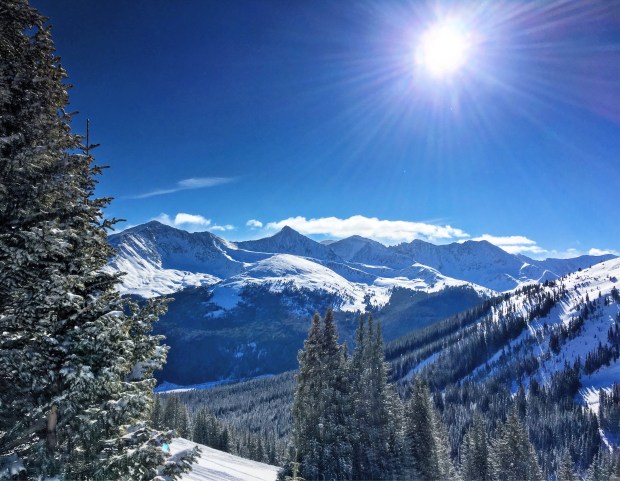You see it all the time at Colorado ski areas: Skiers get off the top chair, toss their skis and boards over their shoulders and hike off into the distance, even though there are perfectly good runs right off the lift.
For years, as a beginner skier new to Colorado, I wondered, “Why are they doing that?”
I’ve since learned better, and the answer can be summed up in the six letters that separate the casual weekend skier from the dedicated and obsessed on the mountain: powder.
Carving up freshly fallen snow previously untouched by human skis is a delight, a reason ski bums sleep in their cars in freezing parking lots or get up at 4 a.m. to be first in line at the lift. There is nothing quite like floating down a mountainside on a blanket of deep powder. The snow flies in your face with every turn, blinding you and choking your cries of joy.
Of course, lots of skiers know this, and unless the storm is pounding it can be tough to find such bliss after a couple hours. That’s where the hiking comes in.
Many ski areas today have “sidecountry” terrain, off-piste ridges, alpine bowls and soaring mountaintops, reachable only by hikes from the chairlift. Ski patrol blasts for avalanche risk and keeps an eye on the area, making it safer than the true backcountry, but the effort of hiking keeps most skiers away and preserves the powder.
And it’s usually worth the effort. Because, for the hardcore and the hard-up for powder, the top of the chair is only the beginning of the journey.
Here are some of the best sidecountry areas at Colorado resorts.
Serenity Bowl, Breckenridge
The newest addition to this massive resort, Peak 6 offers classic Breck runs: long, wide-open and mellow. Then there’s Serenity Bowl. Reached by a short hike from the top of the Kensho Superchair, its wide chutes will thrill you even as the steep terrain tries to spill you.

Horseshoe Bowl, Wolf Creek
This hike is a serious commitment, about 45 minutes out of your day, but worth it. From the top of Alberta Chair you hike up the Knife Ridge and then left on a long traverse with steep dropoffs that will make your head spin if you look down. Then hop onto the free Horseshoe Bowl Snowcat if it’s running and this remote alpine paradise is all yours. It’s a short drop down the steep open bowl then what feels like an endless tree run back to the lift.
Mirkwood Basin, Monarch Mountain
Central Colorado’s Monarch Mountain expanded to include this terrain in recent years. It’s a tough hike from the top of Breezeway Chair, 20 minutes up a steep groomed road and you might have to pull over for the folks who paid a bundle for a daylong snowcat tour. But up here you’ll find short but sweet drops and all the powder you can choke on in the trees while heading back to the chair.

Highland Bowl at Aspen Highlands is the most famous sidecountry terrain in Colorado. Once you make the brutal hike, enjoy the sublime views of the Maroon Bells. Then drop in, enjoy the powder and cross Highland Bowl off your bucket list.
Highland Bowl, Aspen Highlands
This is the Big One, the most famous sidecountry terrain in Colorado. The hike from the top of Loge Peak Lift is brutal and may take an hour or more, “782 sweaty, why-am-I-doing-this, vertical feet,” says the resort website. Pull over to let Aspen locals twice your age fly past you and enjoy the sublime views of the Maroon Bells. This is a rare place in resort skiing, too steep for snow groomers so locals volunteer to come up and bootpack early-season snowfalls. Then drop and cross Highland Bowl off your bucket list.

Kim Havell, who calls it the best new ski run in North America, hikes up the expansive terrain of Palmyra Peak.
Palmyra Peak, Telluride
The San Juan Mountains of southwest Colorado are rugged and wild, nicknamed the “American Alps,” and if you’re at Telluride skiing you can hike to the top of one, 13,320-foot Palmyra Peak. Reached from the top of Lift 12 it’s a long hike past Black Iron Bowl. Many skiers spy their perfect line here and drop in, but persevere and you’ll be rewarded with one of the most intense in-bounds skiing experiences there is.

Union Peak at Copper Mountain ski area in December 2018.
Union Peak, Copper Mountain
This hike is shorter than the others on this list. It will only take you a few minutes from the top of the Mountain Chief chair, but time it right on a powder day and you’ll have the kind of grin-inducing run worth far more than the mild effort it took to hike.
Safety in the sidecountry
- Ski with a partner, as help can be far off
- Wear avalanche safety gear, including a beacon, shovel and probe
- Bring lots of water and dress in layers so you can remove your outer shell while hiking
- Pay careful attention to signs. Some ski areas have gates into the backcountry that will lead you not to the bottom of a lift but into a harsh winter wilderness
- Don’t enter closed areas. Ski patrol may be conducting avalanche control up here and you could wind up on the wrong end of one.
- Step aside for faster hikers behind you. Mountain town locals literally race each other for fresh drops in the upper bowls.

